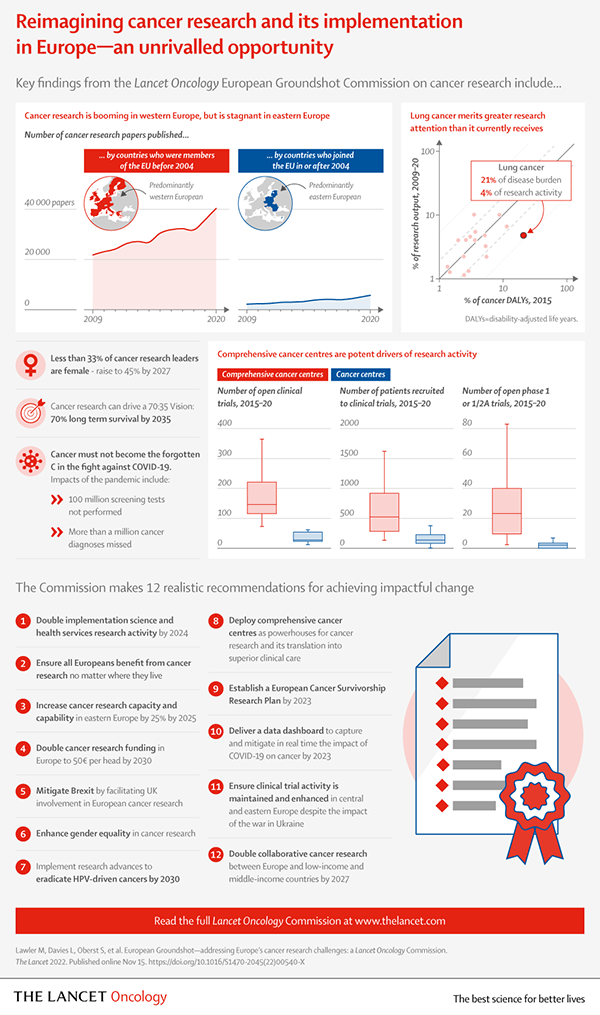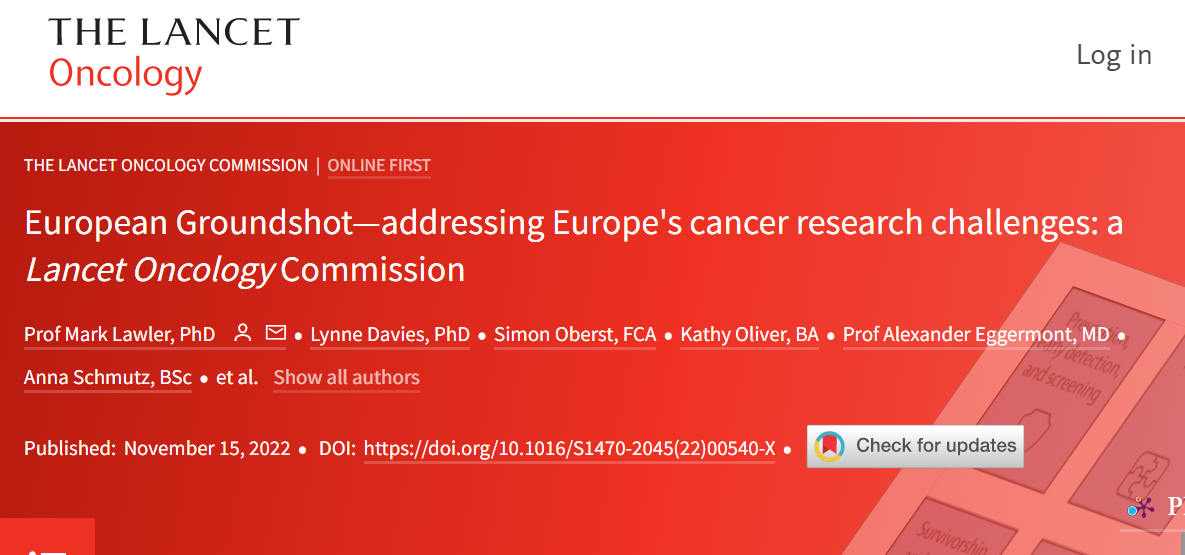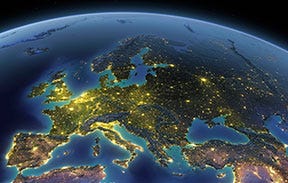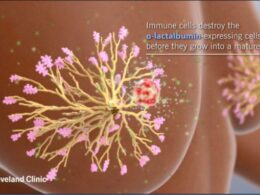The Lancet
Prof Mark Lawler, PhD
Lynne Davies, PhD
Simon Oberst, FCA
Kathy Oliver, BA
Prof Alexander Eggermont, MD
Anna Schmutz, BSc et al
November 15, 2022
Executive Summary edited by :
Joaquim Cardoso MSc
HealthSystems — transformation institute
November 16, 2022
Summary
Cancer research is a crucial pillar for countries to deliver more affordable, higher quality, and more equitable cancer care.
Patients treated in research-active hospitals have better outcomes than patients who are not treated in these settings.
However, cancer in Europe is at a crossroads.
Cancer was already a leading cause of premature death before the COVID-19 pandemic, and the disastrous effects of the pandemic on early diagnosis and treatment will probably set back cancer outcomes in Europe by almost a decade.
Recognising the pivotal importance of research not just to mitigate the pandemic today, but to build better European cancer services and systems for patients tomorrow, the Lancet Oncology European Groundshot Commission on cancer research brings together a wide range of experts, together with detailed new data on cancer research activity across Europe during the past 12 years.
We have deployed this knowledge to help inform Europe’s Beating Cancer Plan and the EU Cancer Mission, and to set out an evidence-driven, patient-centred cancer research roadmap for Europe.
the Lancet Oncology European Groundshot Commission on cancer research brings together a wide range of experts, together with detailed new data on cancer research activity across Europe during the past 12 years.
The high-resolution cancer research data we have generated show current activities, captured through different metrics, including by region, disease burden, research domain, and effect on outcomes.
We have also included granular data on research collaboration, gender of researchers, and research funding.
The inclusion of granular data has facilitated the identification of areas that are perhaps overemphasised in current cancer research in Europe, while also highlighting domains that are underserved.
Our detailed data emphasise the need for more information-driven and data-driven cancer research strategies and planning going forward.
Our detailed data emphasise the need for more information-driven and data-driven cancer research strategies and planning going forward.
A particular focus must be on central and eastern Europe, because our findings emphasise the widening gap in cancer research activity, and capacity and outcomes, compared with the rest of Europe.
Citizens and patients, no matter where they are, must benefit from advances in cancer research.
A particular focus must be on central and eastern Europe, because our findings emphasise the widening gap in cancer research activity, and capacity and outcomes, compared with the rest of Europe.
This Commission also highlights that the narrow focus on discovery science and biopharmaceutical research in Europe needs to be widened to include such areas as:
- prevention and early diagnosis;
- treatment modalities such as radiotherapy and surgery; and
- a larger concentration on developing a research and innovation strategy for the 20 million Europeans living beyond a cancer diagnosis.
Our data highlight the important role of comprehensive cancer centres in driving the European cancer research agenda.
Crucial to a functioning cancer research strategy and its translation into patient benefit is the need for a greater emphasis on health policy and systems research, including implementation science, so that the innovative technological outputs from cancer research have a clear pathway to delivery.
Our data highlight the important role of comprehensive cancer centres in driving the European cancer research agenda.
This European cancer research Commission has identified 12 key recommendations within a call to action to reimagine cancer research and its implementation in Europe.
This European cancer research Commission has identified 12 key recommendations within a call to action to reimagine cancer research and its implementation in Europe.
We hope this call to action will help to achieve our ambitious 70:35 target: 70% average survival for all European cancer patients by 2035.
We hope this call to action will help to achieve our ambitious 70:35 target: 70% average survival for all European cancer patients by 2035.
Infographic
Reimagining cancer research and its implementation in Europe — an unrivalled opportunity

A crucial inflection point for cancer research in Europe has been reached.
The challenge for cancer research in Europe is unequivocal:
- how best can research play a transformative role in promoting more effective prevention;
- facilitating earlier diagnosis;
- delivering better, safer, and potentially more affordable treatments; and
- ensuring enhanced quality of life for current patients and those living beyond cancer?
The Lancet Oncology European Groundshot Commission on cancer research brings together a wide range of experts, together with detailed new data on cancer research activity across Europe during the past 12 years.

Introduction
A crucial inflection point for cancer research in Europe has been reached.
The challenge for cancer research in Europe is unequivocal: how best can research play a transformative role in promoting more effective prevention; facilitating earlier diagnosis; delivering better, safer, and potentially more affordable treatments; and ensuring enhanced quality of life for current patients and those living beyond cancer? Furthermore, how can this challenge be addressed through the prism of the substantial impact of the COVID-19 pandemic and other externalities (eg, Brexit, the Russian invasion of Ukraine, or the economic recession)?
The need for accurate, timely, granular data that capture the current landscape of research activity and highlight the gaps that need to be addressed is crucial to inform a person-centred ambitious cancer research agenda for Europe.
Too often, opinion, even expert opinion, has trumped data in the genesis and implementation of cancer research policies. In this Lancet Oncology European Groundshot Commission on cancer research, we have first focused on generating data to provide an overview of the current European cancer research landscape, highlighting its strengths and capturing its weakness, contrasting areas that have perhaps received an overemphasis of effort with those that have been underserved. Analysing these data and deploying the resulting evidence underpins a series of recommendations and a call to action, which, if acted upon, will help nurture a cancer research culture that delivers pragmatic, patient-focused solutions for Europe.
One unintended consequence of the COVID-19 pandemic, with rapid repurposing of health services and introduction of national lockdowns, has been the adverse effects …
… that these measures and their continuing legacy have had on cancer services, on cancer research, and most importantly on patients with cancer.
To emphasise the scale of this problem, we estimate that about 1 million cancer diagnoses might have been missed across Europe during the COVID-19 pandemic.
To emphasise the scale of this problem, we estimate that about 1 million cancer diagnoses might have been missed across Europe during the COVID-19 pandemic.
There is emerging evidence that a higher proportion of patients are diagnosed with later cancer stages compared with pre-pandemic rates as a result of substantial delays in cancer diagnosis and treatment.
This cancer stage shift will continue to stress European cancer systems for years to come.
There is emerging evidence that a higher proportion of patients are diagnosed with later cancer stages compared with pre-pandemic rates as a result of substantial delays in cancer diagnosis and treatment. This cancer stage shift will continue to stress European cancer systems for years to come.
These issues will ultimately compromise survival and contribute to inferior quality of life for many European patients with cancer.
COVID-19 has regrettably exposed the poor resilience in current cancer health systems that will prompt a cancer epidemic over the next decade if not addressed urgently.
COVID-19 has regrettably exposed the poor resilience in current cancer health systems that will prompt a cancer epidemic over the next decade if not addressed urgently.
Much of the success achieved in improving cancer outcomes over the past two decades in Europe could be reversed by the impact of the pandemic.
Crucially, in the context of this Lancet Oncology Commission, there has been an unsettlingly negative effect of the COVID-19 pandemic on cancer research, …
… with substantial reductions in cancer clinical trial activity, disruption to discovery cancer research, and major reductions in cancer research funding.
Against this backdrop, this Lancet Oncology Commission provides crucial evidence on the current landscape of cancer research across Europe, exposes the key gaps in research, and demands a reprioritisation of European cancer research agendas over the next decade.
We focus on the gaps and inequalities in cancer research that would create a more effective cancer research ecosystem if addressed.
If these gaps and inequalities were addressed, cancer research and its implementation across Europe could be reimagined.
Simply continuing to dedicate resource and effort to a narrow research agenda is no longer desirable or viable: we must follow the data and act on what they reveal.
If these gaps and inequalities were addressed, cancer research and its implementation across Europe could be reimagined.
Simply continuing to dedicate resource and effort to a narrow research agenda is no longer desirable or viable: we must follow the data and act on what they reveal.
Intermediary Sections
See the original publication (this is an excerpt version only)

Reimagining cancer research and its implementation in Europe: a call to action
It has been a brutally challenging few years since the start of the COVID-19 pandemic for the European cancer community as it sought to deliver optimal cancer care and produce high-quality cancer research under unprecedented pressures.
The effects of these circumstances at the time of writing of this Commission are far from over.
The pandemic has highlighted a deficiency in systems’ resilience, prompting reflection on whether the ways in which cancer care and research were delivered before the COVID-19 pandemic best served our citizens, patients, and society.
The pandemic has highlighted a deficiency in systems’ resilience, prompting reflection on whether the ways in which cancer care and research were delivered before the COVID-19 pandemic best served our citizens, patients, and society.
It has become rapidly clear that returning to the so-called old normal will simply not be good enough.
Improving cancer care, research, and education that focuses on the wellbeing of patients and society will require renewed focus, drive, and creativity after the pandemic.
It has become rapidly clear that returning to the so-called old normal will simply not be good enough. Improving cancer care, research, and education that focuses on the wellbeing of patients and society will require renewed focus, drive, and creativity after the pandemic.
In cancer research, there is an unrivalled opportunity to make improvements in the field after the COVID-19 pandemic (ie, to build back better and smarter).
In this Lancet Oncology Commission, we position future European cancer research endeavours as a groundshot, reflecting our aspirations to solve challenges on the ground, and we present our recommendations within a call to action to reimagine cancer research and its implementation in Europe (panel 3).
In this Lancet Oncology Commission, we position future European cancer research endeavours as a groundshot, reflecting our aspirations to solve challenges on the ground, and we present our recommendations within a call to action to reimagine cancer research and its implementation in Europe (panel 3).
The research response to COVID-19 and its rapid transition to clinical care has been revelatory, particularly in the development and approval of the myriad of vaccine options and rapid-testing platforms that have brought citizens, as patients and societies, to a better place.
We can now deploy a similar approach to cancer as we have done with COVID-19.
We must achieve this by continuously following the science and the data.
The research response to COVID-19 and its rapid transition to clinical care has been revelatory, particularly in the development and approval of the myriad of vaccine options and rapid-testing platforms that have brought citizens, as patients and societies, to a better place.
We can now deploy a similar approach to cancer as we have done with COVID-19. We must achieve this by continuously following the science and the data.
Reimagining cancer research and its implementation provides an opportunity to think differently, to embrace a more holistic end-to-end approach, …
… by working closely with patient groups and the cancer workforce to nurture true pan-cancer innovation, and to be unencumbered by barriers or pressure points that would previously have prompted paralysis.
Although the data that we have generated in this Commission have highlighted the challenges that we face in central and eastern Europe, a …
.. focus on research capacity-building and directed funding, and twinning approaches to enhance cancer research activity, its quality, and its implementation in these central and eastern European countries have the potential to be transformational.
Coupled with a more nuanced and much broader portfolio of research and empowered by the ethos of implementation that we have articulated within this Commission, …
… we can start to reimagine a more equality-focused, people-centred, and data-enabled cancer research ecosystem that mandates that the best science and most promising innovations are delivered at pace and at scale, so that the European 70:35 vision is delivered.
… we can start to reimagine a more equality-focused, people-centred, and data-enabled cancer research ecosystem that mandates that the best science and most promising innovations are delivered at pace and at scale, so that the European 70:35 vision is delivered.
References and additional information
See the original publication
About the authors
Prof Mark Lawler, PhD
Lynne Davies, PhD
Simon Oberst, FCA
Kathy Oliver, BA
Prof Alexander Eggermont, MD
Anna Schmutz, BSc
Prof Carlo La Vecchia, MD
Prof Claudia Allemani, PhD
Yolande Lievens, MD
Prof Peter Naredi, MD
Tanja Cufer, MD
Ajay Aggarwal, PhD
Matti Aapro, MD
Kathi Apostolidis, MBA
Anne-Marie Baird, PhD
Fatima Cardoso, MD
Andreas Charalambous, MD
Prof Michel P Coleman, MD
Prof Alberto Costa, MD
Mirjam Crul, PhD
Csaba L Dégi, PhD
Federica Di Nicolantonio, PhD
Sema Erdem, BSc
Marius Geanta, MD
Jan Geissler, MBA
Prof Jacek Jassem, MD
Beata Jagielska, MD
Bengt Jonsson, PhD
Prof Daniel Kelly, PhD
Olaf Kelm, PhD
Teodora Kolarova, MA
Prof Tezer Kutluk, MD
Grant Lewison, PhD
Françoise Meunier, MD
Jana Pelouchova, MSc
Prof Thierry Philip, MD
Richard Price, BA
Prof Beate Rau, MD
Prof Isabel T Rubio
Prof Peter Selby, DSc
Maja Južnič Sotlar, BA
Gilliosa Spurrier-Bernard, MSc
Jolanda C van Hoeve, PhD
Prof Eduard Vrdoljak, MD
Willien Westerhuis, PhD MA
Urszula Wojciechowska, PhD
Prof Richard Sullivan, MD
Originally published at https://www.thelancet.com











